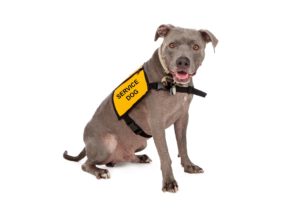 As part of CSU’s commitment to aiding those with disabilities, the university has adopted a policy affirming their rights to have the assistance of service animals and emotional support animals while living, working, and visiting on our campuses.
As part of CSU’s commitment to aiding those with disabilities, the university has adopted a policy affirming their rights to have the assistance of service animals and emotional support animals while living, working, and visiting on our campuses.
Some key facts about the policy include:
- A service animal is any dog that is trained to do work or perform tasks for the benefit of an individual with a disability, including a physical, sensory, psychiatric, intellectual, or other mental disability. The work must be active and specifically related to the person’s disability. Simply providing comfort or emotional support does not qualify a dog as a service animal under the Americans with Disabilities Act. On a limited, case-by-case basis, a miniature horse that has been similarly individually trained may also qualify as a service animal.
- Service dogs are needed by individuals with disabilities to enable them to access all the areas of our campuses where they may go, just as a person without a disability would do. These dogs are specially trained for these tasks.
- Service dogs are not required by law to be identified by any vest, harness, tag or other indicators.
- An emotional support animal is not the same as a service dog. An emotional support animal is an animal that has been verified by the university to be necessary to accommodate an individual with a disability by providing emotional support, comfort, or therapy in a university housing facility.
- Emotional support animals accommodate an individual with a disability within that person’s residence. Emotional support animals do not accompany their owners outside of the home, except as needed to care for the animal. They also are not permitted in other university buildings or at events. Students may not bring their emotional support animals to class, nor may employees have them in the workplace.
To ensure equal access and nondiscrimination of individuals with disabilities who are using a service dog, members of the CSU community should:
- Allow service dogs to accompany people with disabilities on campus;
- Do not ask for details about a person’s disabilities;
- Do not pet, interact, or feed a service dog. It distracts the dog from its work;
- Do not deliberately startle, tease, or taunt a service animal;
- Do not separate or attempt to separate a person from their service animal; and
- Provide individuals with service animals with the right of way with respect to pedestrians, cyclists and skateboarders.
More information and the complete policy is at the university’s policy library, and FAQs.